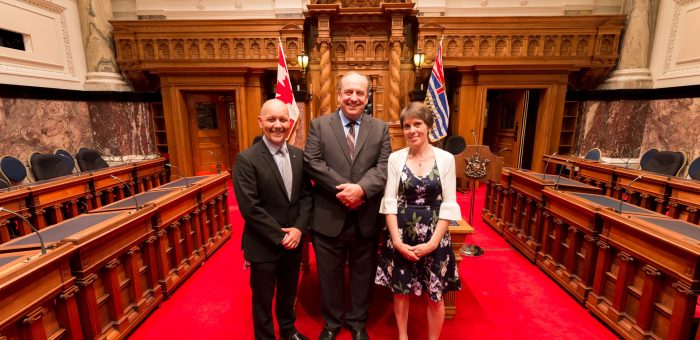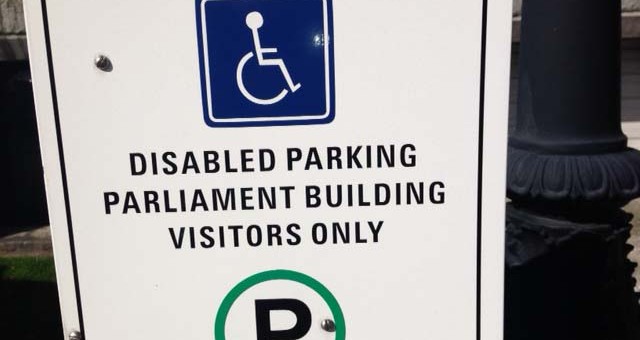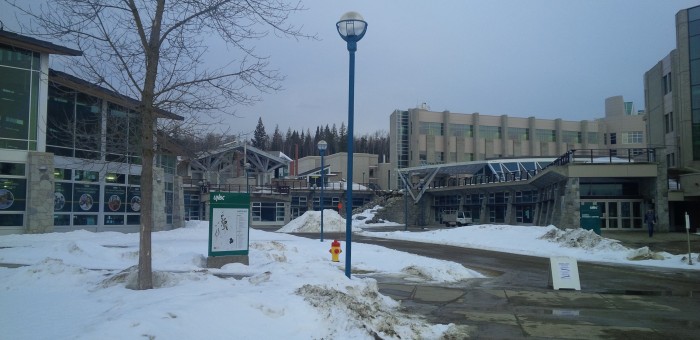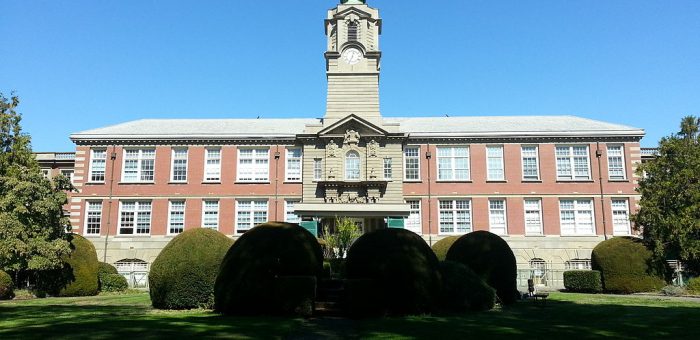Education
My initial reaction to the BC Liberal Speech from the Throne
Today in the legislature the Lieutenant Governor read the BC Liberal Speech from the Throne. Below I reproduce the media statement that I released following the speech:
Initial Response
Victoria B.C. – Andrew Weaver, leader of the B.C. Green Party, responded to today’s Speech from the Throne.
The astonishing about-face taken by the B.C. Liberal government in this throne speech demonstrates the difference that the B.C. Greens made in the election and that we continue to make everyday with the minority government.
We committed to addressing the most pressing issues facing British Columbians. For the first time, we now have all-party agreement on major issues like banning big money, investing significantly in child care and raising social assistance rates. All three parties now support holding a referendum on proportional representation that will give British Columbians a legislature that reflects our province’s diversity.
The B.C. Liberals have been in power for sixteen years and until now actively opposed many of these policies. I am heartened to see them adopt so many B.C. Green policies that will address these issues in today’s throne speech. I am also pleased to hear of their willingness to work across party lines. After all, what could be more stable than all three parties working together to advance major policies that will benefit British Columbians.
The confidence vote is a matter of trust. We cannot have confidence in a government that for sixteen years has argued against these policies, and in the last few days has suddenly recognized that they are in the best interests of British Columbians. We will look to the Liberals to demonstrate a genuine willingness to follow through on these commitments regardless of where they sit in the legislature.
Leaders from all three parties have recognized that the results of this election present a once-in-a-lifetime opportunity to work together. I look forward to collaborating with my colleagues on both sides of the house to deliver on the change British Columbians voted for.
-30-
Bill M227 — Court Order Enforcement Amendment Act
Today in the legislature I introduced a private members Bill M227 —Court Order Enforcement Amendment Act, 2017. The bill adds Registered Disability Savings Plans (RDSPs) and Registered Education Savings Plans (RESPs) to the list of plans protected under the act.
Registered Retirement Savings Plans (known as RRSPs) were first introduced federally in 1957. Legislation enabling Registered Retirement Income Funds (known as RRIFs) was subsequently brought forward in the late 1970’s.
RRSPs and RRIFs are protected in BC and most other provinces from creditors in the case of personal bankruptcy. Protecting these funds provides a glimmer of hope that individuals undergoing bankruptcy will not be destitute in their old age.
In 2008 Federal legislation was passed to allow for the creation of Registered Disability Savings Plans (RDSPs). The RDSP is a federal, tax-deferred, long-term savings plan for people with disabilities who want to save for the future. Unfortunately, under our outdated Court Order Enforcement Act, 1996, RDSPs are not listed as a registered plan in BC’s legislation and are therefore not exempt from creditor protection. Should an individual with an RDSP go into debt, their savings in the RDSP will not be protected from seizure. The same is true for Registered Education Savings Plans (known as RESPs). A child should not have their education investment seized due to misfortune that befalls their parents. Alberta has protected RESPs; we should follow suit.
I asked the Minister of Justice about this problem in question period three years ago. At the time, the Minister said that it was an important issue and that she’d be glad to work with me to move it forward. Yet three years have now passed and still nothing has changed. Seeing as I haven’t seen any meaningful progress from the government on this simple legislative change, I decided to offer them a possible solution, yet again.
Text of Bill Introduction
A. Weaver: I move that a bill intituled the Court Order Enforcement Amendment Act, of which notice has been given, be introduced and read a first time now.
Motion approved.
A. Weaver: Registered retirement savings plans are protected in this province from creditors in the case of personal bankruptcy.
Protecting these funds provides a small safeguard that individuals undergoing bankruptcy will not be completely destitute in their old age. It is a good law that most provinces in Canada have adopted.
However, there is no protection for funds that are part of a registered education savings plan or a registered disability savings plan. These are important funds that need equal protection, recognizing that a child should not have their education investment seized due to a misfortune that befalls their parents.
The Alberta government has passed legislation to protect RESPs. It is with this in mind that I bring this bill forward today. This bill amends the Court Order Enforcement Act to ensure that RESPs and RDSPs are protected by law from predators.
I move that the bill be placed on the orders of the day for second reading at the next sitting of the House after today.
Bill M 227, Court Order Enforcement Amendment Act, introduced, read a first time and ordered to be placed on orders of the day for second reading at the next sitting of the House after today.
Video of Bill Introduction
Bill M221 — School Amendment Act, 2017
Today in the legislature I introduced a private member’s bill entitled Bill M221 — School Amendment Act, 2017. This Bill amends the School Act to require that a by-election be held within one year of school board trustees being removed and an official trustee being appointed to a District Board of Education. This situation arises, for example, when a school board is fired as has occurred in Vancouver School District 39 and North Okanagan Shuswap School District 83. This Bill recognizes the importance of the democratic nature of school boards. It is essential that school boards are elected so that they are accountable to the communities they serve, and so that they reflect the distinct nature of the district they represent.
Text of my Introduction
A. Weaver: It gives me pleasure to move that a bill intituled School Amendment Act, 2017, of which notice has been given, be introduced and read a first time now.
Motion approved.
A. Weaver: This bill amends the School Act to require that a by-election be held within one year of school board trustees being removed and an official trustee being appointed to a district board of education. This situation arises, for example, when a school board is fired.
This bill recognizes the importance of the democratic nature of school boards. It’s essential that school boards are elected so that they can be accountable to the communities they serve and so that they reflect the distinct nature of the district they represent. To this end, this bill would ensure that an appointed trustee cannot be in place for more than one year before an election is held.
I move that the bill be placed on the orders of the day for second reading at the next sitting of the House after today.
Bill M221, School Amendment Act, 2017, introduced, read a first time and ordered to be placed on orders of the day for second reading at the next sitting of the House after today.
Video of my Introduction
Media Release
Weaver introduces bill to require by-elections when a school board trustee is appointed
For immediate release
February 23rd, 2017
VICTORIA B.C. – When a school board is removed and an official trustee is appointed, it is essential that an election be held as soon as possible thereafter, to protect the democratically elected nature of school boards.
Today Andrew Weaver, Leader of the B.C. Green Party, introduced the School Amendment Act. The bill requires that by-elections be held within one year of school board trustees being removed and an official trustee being appointed to a District Board of Education. This situation arises, for example, when a school board is fired.
“This bill recognizes how important it is that our school boards are democratically elected. School boards that reflect and understand the unique nature of their district are better able to serve their communities,” says Weaver, also the MLA for Oak Bay-Gordon Head.
“Elections ensure that school boards are accountable to their community, and provide for local representation in decision-making.
“If passed, this amendment would protect the democratic nature of school boards by ensuring that an appointed trustee cannot be in place for more than one year before an election is held.”
– 30 –
Media contact
Mat Wright, Press Secretary
+1 250-216-3382 | mat.wright@leg.bc.ca
A bill to reform university governance in British Columbia
Today in the legislature I introduced a private member’s bill entitled Bill M222 —University Amendment Act, 2017. The purpose of this bill is to halt the creeping government interference in university governance, an issue I have previously raised in the past.
The independence of a University Board is critical. The purpose of a university is to educate people who can critically assess information to allow them to participate in an informed manner in a democracy. It’s a place that allows for innovation and creativity to flourish. It’s not a place for government to drive a top down imposition of its ideology. Unfortunately, under existing legislation the government has the potential to interfere in ways that could undermine that autonomy.
The Auditor General’s February 2014, University Board Governance Examinations report specifically notes:
The governance of universities is unique in that they have two governing bodies: the Senate
and the Board of Governors. The Senate operates in an autonomous manner from Government due to its academic responsibilities. The Board of Governors, on the other hand, has an accountability relationship with the Ministry of Advanced Education, as well as an important linkage between the university, Senate, and the local community.
The current composition of the Senate in special purpose teaching universities can potentially give the administration of these universities the majority vote. This also harms the ability of the Senate to keep the academic autonomy of the university at arm’s length from government.
The potential of political interference is unacceptable for our institutions of higher learning. My hope is that the government takes my suggestions for solving this issue seriously and takes action on this issue immediately to preserve the independence of our academic institutions.
Below I reproduce the text and video of the speech I gave as I introduced the bill. I also include the accompanying media release.
Text of my Speech
A. Weaver: I move that a bill intituled University Amendment Act, 2017, of which notice has been given, be introduced and read a first time now.
Motion approved.
A. Weaver: It gives me great pleasure to be introducing a bill termed the University Amendment Act. Universities in the province of British Columbia serve a key role in an economy that is that increasingly driven by knowledge, information and ideas. Academic freedom is a fundamental tenet for a culture of learning to succeed and a key part of academic freedom is found in the right to participate in the university governance.
While the role of a board of governors is essential in a university, the governance of a university must also be independent. It is with this in mind that I bring this bill forward today. This bill amends the University Act to ensure that appointees from the Lieutenant-Governor-in-Council cannot unilaterally set the tone and direction of a university board through having a majority of votes and that university boards cannot unilaterally appoint a chancellor for the university.
This act also amends the University Act to change the composition, not the powers, of the senate for special purpose teaching universities. The current composition of the senate in special purpose teaching universities can potentially give the administration of these universities the majority vote. This harms the ability of the senate to keep the academic autonomy of the university at arm’s length from government. This bill will bring British Columbia to the same university governance standards employed by much of the rest of Canada.
I move that the bill be placed on the orders of the day for second reading at the next sitting of the House after today.
Bill M222, University Amendment Act, 2017, introduced, read a first time and ordered to be placed on orders of the day for second reading at the next sitting of the House after today.
Video of my Speech
Media Release
Weaver tables University Amendment Act to protect academic autonomy
For immediate release
February 23rd, 2017
VICTORIA B.C. – Government intrusion in university governance is compromising the credibility of B.C.’s world class academic institutions.
“The purpose of this bill is to halt the creeping government interference in university governance,” says Andrew Weaver, Leader of the B.C. Green Party. “While the role of a Board of Governors is essential in a university, the governance of a university must also be independent.
“Universities in our province serve a key role in an economy that is increasingly driven by knowledge, information and ideas. Academic freedom is a fundamental tenant for a culture of learning to succeed and a key part of academic freedom is found in the right to participate in the university’s governance.”
This Bill amends the University Act to ensure that appointees from the Lieutenant Governor in Council cannot unilaterally set the tone and direction of a university board through having a majority of votes, and that university boards cannot unilaterally appoint a Chancellor for their university.
It also amends the University Act to change the composition of the Senate for special purpose teaching universities. As it currently stands, it is possible for the administration (instead of faculty) of these universities to have the majority vote which harms the ability of the senate to keep the academic autonomy of the university at arm’s length from government.
MLA Weaver tabled a less comprehensive version of this bill last February in response to two significant controversies at B.C. universities. In a subsequent article in the Georgia Strait entitled Arvind Gupta, Andrew Weaver, and the future of B.C.’s Universities, author Charlie Smith detailed how MLA Weaver was in a unique position to address the situation.
– 30 –
Media contact
Mat Wright, Press Secretary
+1 250-216-3382 | mat.wright@leg.bc.ca
Backgrounder
In 2008 the BC Liberals amended the University Act to allow the University Board of Governors to appoint a university’s Chancellor. The BC NDP started this trend in 1997 by allowing the Board of Governors at the Technical University of BC to appoint its Chancellor.
MLA Weaver’s University Amendment Act amends the University Act to reduces the number of board members that the Lieutenant Governor in Council appoints and it empowers the convocation of universities to elect their Chancellor. In doing so, this Act introduces a standard of autonomy for the governance of universities to ensure they are free from political interference in their internal operations.
This Act also amends the University Act to change the composition, not the powers, of the Senate for special purpose teaching universities.
The governance of universities is unique in that they have two governing bodies: the Senate and the Board of Governors. The Senate operates in an autonomous manner from Government due to its academic responsibilities. The Board of Governors, on the other hand, has an accountability relationship with the Ministry of Advanced Education, as well as an important linkage between the university, Senate, and the local community.
The current composition in the University Act of the Senate in special purpose teaching universities can potentially give the administration of these universities the majority vote. This would harm the ability of the Senate to keep the academic autonomy of the university at arm’s length from government. By way of contrast, faculty hold the majority of votes in the senates for research universities. This bill ensures that the Senate composition at special purpose teaching universities is similar to that at research universities.
Fixing a Gap in Adult Education
A number of constituents have contacted me regarding the high cost of upgrading high school courses. I wrote to the Minister of Education to ask that he consider removing the barriers to educational access that his government put in place in May 2015. I received a disappointing response which failed to address the key concerns of the letter.
I subsequently wrote to the Minister of Advanced Education urging him to close a gap in coverage that the policy change had created. When government chose to end funding for high school graduates upgrading secondary courses, they forced secondary schools to charge tuition to high school graduates. This included public schools, like SIDES or The Link, which offer online classes and are well suited for academic upgrading.
Along with the policy change government introduced the Adult Upgrading Grant, which is administered by the Ministry of Advanced Education and is meant to provide some support for low-income students. However, this grant only covers courses taken at post-secondary institutions and does not include any of the secondary schools which now have to charge tuition to high school graduates. I asked the minister to extend the grant to a more diverse group of schools, in particular to secondary schools which focus on distributed learning and currently have high rates of enrollment for students upgrading courses.
A non trivial component of the government’s surplus has come at the expense of those who can least afford it. Cuts to those seeking to upgrade their high school education to pursue work and educational opportunities do nothing more than perpetuate the poverty trap. British Colombians deserve a government which will make education more accessible for all British Colombians.
Below I reproduce the text of my letter and I will share the response when it is forthcoming.
Text of the Letter
February 12, 2017
Honourable Andrew Wilkinson
Minister of Advanced Education
PO Box 9080 Stn Prov Govt
Victoria BC
V8W 9E2
Canada
Dear Minister Wilkinson,
I’m writing to you in light of concerns that constituents have brought to my attention regarding the high cost of upgrading high school courses.
As you know, in 2015, the provincial government ended funding for students upgrading high school courses, if they have already graduated. Since that policy change, returning students now face a fee, generally $500-$550 per course, to take grade 11/12 course. These fees place an undue burden on individuals, and their families, as they work to expand their professional and academic opportunities.
I have learned that at the South Island Distance Education School (SIDES) in Victoria alone, there are hundreds of students who are unable to afford the fees of upgrading their courses, and thus remain on the waitlist. This does not include the many who don’t even apply to join the waitlist, discouraged from doing so when they learn the cost.
I have written the Minister of Education about my concerns with this policy and am now writing you to outline a specific gap that it has created.
The Ministry of Education still funds high school courses for students who have not graduated. The Ministry of Advanced Education provides support for low-income students who have graduated and are taking high school level courses at one of nineteen post-secondary institutions.
There is, however, no support for students who have graduated high school and are pursuing academic upgrading through institutions other than post-secondary schools. For example, high school graduates attending public schools in Victoria, like SIDES or the Link, are not eligible for tax deductions, reimbursement under RESPs, or the Adult Upgrading Grant.
These two schools specialize in providing a flexible academic environment to accommodate the needs of students. With many returning students are juggling career and family obligations, this an ideal environment for them to return. Attending a school focused on secondary education can also be less jarring return to the education system for many students.
I find it difficult to understand why two students of similar income levels could take equivalent courses that have comparable prices and that only one would receive government support.
As your ministry oversees the Adult Upgrading Grants, I ask that you increase the number of institutions which are approved to administer them. Specifically, I ask that you give public schools that have a focus on distributed learning the ability to authorize these grants.
If you feel that this falls outside the purview of your ministry, then I urge you to coordinate with the Minister of Education and develop a funding program which would achieve the same results.
I fully believe that we should all fund students who pursue academic upgrading, whether or not they’ve graduated. British Columbians have been promised a high school education, and there is more to that than just a diploma. Whether or not someone has graduated, they should be supported as they flesh out their secondary education, seeking to open their mind or opportunities.
At the very least, this government should, fill the gap that has been created by its policy change and provide the Adult Upgrading Grant to a more diverse group of institutions, including specialized secondary schools.
Sincerely,
Andrew Weaver
MLA, Oak Bay-Gordon Head








